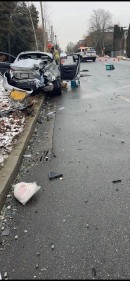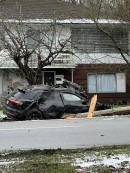The video of a crash involving an Audi e-tron SUV is making rounds on social media. The weird part is that the battery pack was ejected during the crash, which was not supposed to happen. Are Audi e-tron affected by structural problems? We wish an investigation would find the answer.
Electric vehicles are heavy beasts, which makes them behave like a rock in the case of a collision. The heaviest single part of an EV is the battery pack, with anywhere between a quarter and a third of an EV’s total weight. In absolute terms, a Li-Ion battery weighs between 1,060 lb (480 kg) for the Tesla Model 3 to more than 2,900 lb (1,320 kg) on a GMC Hummer EV. Nevertheless, electric vehicles are built with battery packs as part of their body structure, increasing torsional rigidity and contributing to a high level of safety.
At least that’s what Audi claims about the e-tron (now Q8 e-tron), its first mass-produced electric vehicle. Audi explains on its Technology portal that the Li-Ion battery is bolted to the body structure at 35 points, resulting in a sophisticated crash structure. Nevertheless, all these went to waste during a high-speed crash on Tuesday afternoon in Richmond, British Columbia (Canada). The video, which has become viral, shows the Audi e-tron ejecting the battery as it rolls into the air following the crash.
The Audi e-tron driver was distracted as it approached a red light at high speed. The driver tried to avoid a rear-end crash using the right lane, but it hit a Toyota Corolla that proceeded through the intersection on a green light. The Audi clipped the rear of the Corolla and was projected into the air, causing it to roll and hit several trees and a utility pole. The force of the impact was so huge that the battery pack was ripped off and sent sliding down the road before stopping on the median and catching fire.
Fortunately, both drivers escaped with minor injuries from the crash, and the battery didn’t hit anyone in its path. Nevertheless, the fact that the battery pack detached from the SUV’s body is disturbing, hinting at potential structural problems for Audi’s electric SUV. It is not clear whether this is a singular case or the battery pack ejected in other crashes involving the Audi e-tron. Audi has not commented on the impact, although we’ve reached out to them for more information.
Interestingly, the mainstream media coverage forgoes mentioning Audi in the titles, using “SUV” or “EV” instead. This shows a negative bias against Tesla, whose name always makes headlines every time one of its cars crashes. As badly built as Teslas are thought to be, we haven’t heard yet of one losing its battery pack in a crash. Tesla pioneered the integration of battery cells into the body structure of their cars, resulting in what they call a “structural battery pack.”
At least that’s what Audi claims about the e-tron (now Q8 e-tron), its first mass-produced electric vehicle. Audi explains on its Technology portal that the Li-Ion battery is bolted to the body structure at 35 points, resulting in a sophisticated crash structure. Nevertheless, all these went to waste during a high-speed crash on Tuesday afternoon in Richmond, British Columbia (Canada). The video, which has become viral, shows the Audi e-tron ejecting the battery as it rolls into the air following the crash.
The Audi e-tron driver was distracted as it approached a red light at high speed. The driver tried to avoid a rear-end crash using the right lane, but it hit a Toyota Corolla that proceeded through the intersection on a green light. The Audi clipped the rear of the Corolla and was projected into the air, causing it to roll and hit several trees and a utility pole. The force of the impact was so huge that the battery pack was ripped off and sent sliding down the road before stopping on the median and catching fire.
Fortunately, both drivers escaped with minor injuries from the crash, and the battery didn’t hit anyone in its path. Nevertheless, the fact that the battery pack detached from the SUV’s body is disturbing, hinting at potential structural problems for Audi’s electric SUV. It is not clear whether this is a singular case or the battery pack ejected in other crashes involving the Audi e-tron. Audi has not commented on the impact, although we’ve reached out to them for more information.
Interestingly, the mainstream media coverage forgoes mentioning Audi in the titles, using “SUV” or “EV” instead. This shows a negative bias against Tesla, whose name always makes headlines every time one of its cars crashes. As badly built as Teslas are thought to be, we haven’t heard yet of one losing its battery pack in a crash. Tesla pioneered the integration of battery cells into the body structure of their cars, resulting in what they call a “structural battery pack.”
The battery. pic.twitter.com/yKixrRqZev
— Bojan (@bokibarum) February 2, 2023






